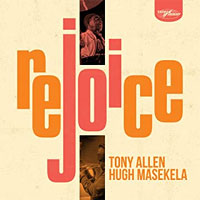Tony Allen and Hugh Masekela • Rejoice
 ejoice has a
suspect production history; South African flugelhorn player Hugh Masekela and
Nigeria’s pioneering Afrobeat drummer Tony Allen had recorded together, apparently in
duo (details are sketchy), in London in 2010. The music sat in the can until after
Masekela’s death early in 2018, when Allen massaged the tapes for release, adding
various rhythm players here and there. That history will trigger skepticism from those who
recall certain posthumous works by Miles Davis, Jimi Hendrix and others, in which solo
lines from uncompleted projects were inserted into contexts those artists never signed off
on. Rejoice, happily, doesn’t sound as cynical as one of those, partly because
the surviving co-leader did sign off (working alongside producer/primary mover Nick Gold),
partly because the sweetening is refreshingly minimal: a thumping acoustic- or
electric-bass line up the middle, and maybe a spray of Lekan Barabola’s hand
percussion. The leaders are out front and in fine form. ejoice has a
suspect production history; South African flugelhorn player Hugh Masekela and
Nigeria’s pioneering Afrobeat drummer Tony Allen had recorded together, apparently in
duo (details are sketchy), in London in 2010. The music sat in the can until after
Masekela’s death early in 2018, when Allen massaged the tapes for release, adding
various rhythm players here and there. That history will trigger skepticism from those who
recall certain posthumous works by Miles Davis, Jimi Hendrix and others, in which solo
lines from uncompleted projects were inserted into contexts those artists never signed off
on. Rejoice, happily, doesn’t sound as cynical as one of those, partly because
the surviving co-leader did sign off (working alongside producer/primary mover Nick Gold),
partly because the sweetening is refreshingly minimal: a thumping acoustic- or
electric-bass line up the middle, and maybe a spray of Lekan Barabola’s hand
percussion. The leaders are out front and in fine form.
Masekela sang too; a couple of tracks feature his overdubbed choral vocals in Zulu (“Robbers, Thugs and Muggers” and his salute to Allen, “Jabulani”), and he preaches a spirited (if none too deep) shout-out to Fela Kuti. Whenever Masekela leads with a vocal, the start of his brass solo makes a direct connection to that melody, driving home the point that flugelhorn is his other singing voice. Live, Masekela could spend more time singing than playing, but here four of eight tracks are purely instrumental, and his flugelhorn is heavily featured -- plenty to go around. He tends to sound that fat horn at the top of its range, so you could mistake it for the leaner trumpet he’d played first, and when he clicked in 1968 with “Grazing in the Grass.” His flugel never gets Mangione-mellow. His sound is full and plump (fortified with/trailed by a trace of slapback reverb), with a bit of bite; he has a moderately punchy attack, and a relaxed behind-the-beat rhythm feel, kicked along by swinging triplety phrases. (Jazz left a mark early -- the movie Young Man with a Horn turned him on to trumpet.) He likes orderly stepwise sequences, and medium tempos that let him think a solo line through. The folkloric simplicity reminds me of globetrotter Don Cherry, but Masekela’s chops don’t falter as latter-day Cherry’s could. The upswing in Tony Allen’s fortunes in the jazz world stems from a 2017 Blue Note EP where he plays tunes from drummer Art Blakey’s repertoire -- recontextualizing Allen’s own syncopated bounce, the ramshackle interplay between snare and bass drum at the heart of his style, punctuated by the sizzle of a slowly closing hi-hat. His percolating beat also has a lot of jazz in it -- Blakey and Max Roach LPs were formative influences. But here as elsewhere, once a tune’s pattern is set, he won’t deviate much. He’s less interactive than a proper jazz drummer who responds to or feeds a soloist’s phrases; Allen’s drums are more structural layer than running commentary. But with that powerful polyrhythmic groove, those stubborn patterns work for him. (The stereo picture just about places you on his drum throne, surrounded by the kit.) As mentioned, the add-ons -- a smattering of English players and London-based Nigerians -- were called in to discreetly fill in the texture: Lewis Wright from the fine UK band Empirical adds murmuring vibes to three tracks, a background halo. On three instrumentals including an “Obama Shuffle Strut Blues,” where Elliot Galvin adds burbling synth bass, mixed low, esteemed tenor saxophonist Steve Williamson plays the slightly tricky melodies with Masekela; they’re so well blended (phrasing-wise and sound-wise) that he sounds like he’d been there all along. Some apparent studio trickery: on the medium-slow strut “Jabuani,” Wright trades phrases with Masekela: presumably his phrases come from a solo, cut up and maybe resequenced. Sometimes a melody is dropped back into the middle of a tune, harking back to the literal repeats that added structure to Miles Davis’s In A Silent Way a half-century ago. (The studio as instrument has its own traditions.) The only real question here is, does it work -- does it sound musically and sonically plausible? It works for me. Postscript: The month after Rejoice’s release, Tony Allen died in Paris at 79, on April 30, 2020. |
